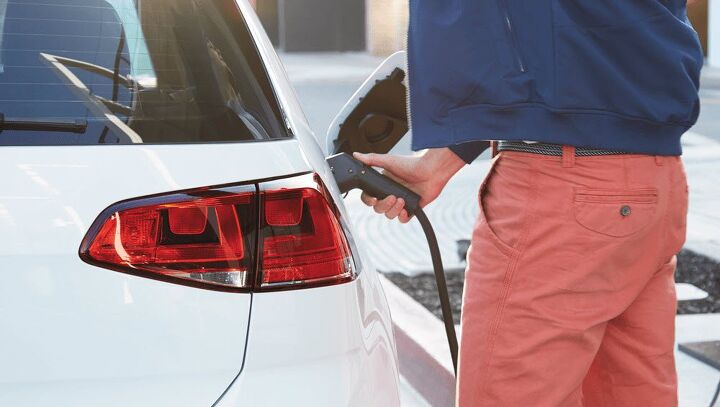Electric Vehicles Could Short Governments $92 Billion in Taxes by 2030

As governments across the globe push for the proliferation of electric vehicles, they’re creating a new problem for themselves. While EVs may be helpful in mitigating pollution in and around city centers, they’re not going to be nearly as friendly on the infrastructure.
A report from the International Energy Agency suggests the ramp-up of battery powered automobiles could result in a $92 billion tax shortfall by 2030, assuming everything goes according to plan. But even if global governments only manage to get halfway to their intended electrification goals, they’re still missing out on an estimated $47 billion in fuel duties.
That translates into the world needing somewhere between 4.8 and 2.6 million fewer barrels of gasoline and diesel per day, according to the Financial Times. Still, as impressive as that sounds, we’re nowhere near that mark just yet. Despite EVs having their best sales year on record in 2017, the vehicles themselves still only accounted for around 1 percent of the total market.
Automakers and enthusiastic governments hope to increase that figure to 30 percent by 2030. Some nations aim to phase out exclusively gas-powered vehicles entirely by 2040. While it remains to be seen if these ambitious goals are feasible, even approaching them will have unintended consequences.
Losing out on fuel taxes will be enough of a blow to governments that most will need to pursue other means of financing infrastructure projects in the coming years. “The major increase in the estimate of foregone revenues for the 2030 timeframe suggest that, for governments to retain sufficient income to invest in and maintain infrastructure, as well as to cover externalities from road transport, alternative taxation systems will be needed,” the the International Energy Agency said, suggesting road tolls and congestion charges as possible alternatives.
Other estimates are less forgiving. The center-right think tank Policy Exchange claims the United Kingdom alone could lose as much as $225 billion in fuel taxes between now and 2030.
There are all kinds of hidden dangers and benefits linked to EV adoption. Replacing oil-based propulsion with energy that could potentially be sourced from renewable resources is good for the environment. But some suggest widespread implementation of electric cars would do a number on most countries’ power grids, and battery construction has a higher environmental cost than one might think. The world is also butting up against a potential shortage on the materials necessary to facilitate expanded battery production, and EVs don’t address the simple fact that there are more miles being driven than ever before.
Even something as seemingly innocuous as online shopping has had a meaningful impact on the environment, as a multitude of delivery vehicles have been added to roadways to cope with deliveries. Meanwhile, people still undertake their daily commutes while ever greater numbers of cars, commercial trucks, ships, and airplanes roll out of factories. Electric or not, it all has to be powered somehow. Most new power plants don’t use renewable energy.
Those are disparate issues, though. Simply finding the money necessary to maintain roads will be a big enough challenge in itself — even if electric vehicles don’t end up being nearly as popular as predicted.
[Image: Electrify America]

A staunch consumer advocate tracking industry trends and regulation. Before joining TTAC, Matt spent a decade working for marketing and research firms based in NYC. Clients included several of the world’s largest automakers, global tire brands, and aftermarket part suppliers. Dissatisfied with the corporate world and resentful of having to wear suits everyday, he pivoted to writing about cars. Since then, that man has become an ardent supporter of the right-to-repair movement, been interviewed on the auto industry by national radio broadcasts, driven more rental cars than anyone ever should, participated in amateur rallying events, and received the requisite minimum training as sanctioned by the SCCA. Handy with a wrench, Matt grew up surrounded by Detroit auto workers and managed to get a pizza delivery job before he was legally eligible. He later found himself driving box trucks through Manhattan, guaranteeing future sympathy for actual truckers. He continues to conduct research pertaining to the automotive sector as an independent contractor and has since moved back to his native Michigan, closer to where the cars are born. A contrarian, Matt claims to prefer understeer — stating that front and all-wheel drive vehicles cater best to his driving style.
More by Matt Posky
Latest Car Reviews
Read moreLatest Product Reviews
Read moreRecent Comments
- MaintenanceCosts There's not a lot of meat to this (or to an argument in the opposite direction) without some data comparing the respective frequency of "good" activations that prevent a collision and false alarms. The studies I see show between 25% and 40% reduction in rear-end crashes where AEB is installed, so we have one side of that equation, but there doesn't seem to be much if any data out there on the frequency of false activations, especially false activations that cause a collision.
- Zerocred Automatic emergency braking scared the hell out of me. I was coming up on a line of stopped cars that the Jeep (Grand Cherokee) thought was too fast and it blared out an incredibly loud warbling sound while applying the brakes. I had the car under control and wasn’t in danger of hitting anything. It was one of those ‘wtf just happened’ moments.I like adaptive cruise control, the backup camera and the warning about approaching emergency vehicles. I’m ambivalent about rear cross traffic alert and all the different tones if it thinks I’m too close to anything. I turned off lane keep assist, auto start-stop, emergency backup stop. The Jeep also has automatic parking (parallel and back in), which I’ve never used.
- MaintenanceCosts Mandatory speed limiters.Flame away - I'm well aware this is the most unpopular opinion on the internet - but the overwhelming majority of the driving population has not proven itself even close to capable of managing unlimited vehicles, and it's time to start dealing with it.Three important mitigations have to be in place:(1) They give 10 mph grace on non-limited-access roads and 15-20 on limited-access roads. The goal is not exact compliance but stopping extreme speeding.(2) They work entirely locally, except for downloading speed limit data for large map segments (too large to identify with any precision where the driver is). Neither location nor speed data is ever uploaded.(3) They don't enforce on private property, only on public roadways. Race your track cars to your heart's content.
- GIJOOOE Anyone who thinks that sleazbag used car dealers no longer exist in America has obviously never been in the military. Doesn’t matter what branch nor assigned duty station, just drive within a few miles of a military base and you’ll see more sleazbags selling used cars than you can imagine. So glad I never fell for their scams, but there are literally tens of thousands of soldiers/sailors/Marines/airmen who have been sold a pos car on a 25% interest rate.
- 28-Cars-Later What happened to the $1.1 million pounds?I saw an interview once I believe with Salvatore "the Bull" Gravano (but it may have been someone else) where he was asked what happened to all the money while he was imprisoned. Whomever it was blurted out something to the effect of "oh you keep the money, the Feds are just trying to put you away". Not up on criminal justice but AFAIK the FBI will seize money as part of an arrest/investigation but it seems they don't take you to the cleaners when they know you're a mobster (or maybe as part of becoming a rat they turn a blind eye?). I could really see this, because whatever agency comes after it has to build a case and then presumably fight defense counsel and it might not be worth it. I wonder if that's the case here?


































Comments
Join the conversation
annual road use tax paid at registration renew. (curb weight X .05) X (miles driven / 15,000) X (30 / epa combined MPG). 3000 lb sedan 20,000 miles with 28 mpg = $215 - DD 6000 lb truck 7000 miles 19mpg = $206 - camper/boat 5000 lb suv 15,000 miles 15mpg = $467 - 100lb wifey shopping. If you don't want no goberment checking your miles driven it defaults to 25,000.
ZOMG, whatever shall we do! Sheesh. You can charge per mile with a dongle in the OBD port. Or levy an annual registration surcharge on EVs. Or move toward congestion charges and toll roads, where the user pays. Or some combination of the above. All are being done in various places. None are hard.